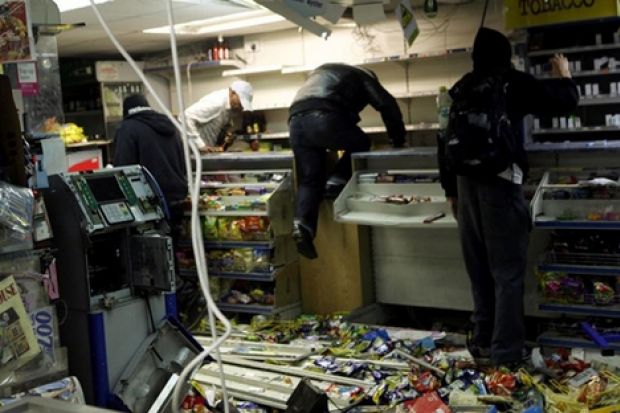Scenes of riots and looting beamed around the world last week could affect the recruitment of overseas students to UK universities, experts have said.
The warning came as Malaysian student Mohammed Ashraf Haziq became one of the most high-profile victims of the violence after he was robbed by youths posing as Good Samaritans - an incident seen by millions after footage was posted on YouTube.
Beatrice Merrick, director of services and research at the UK Council for International Student Affairs, said the alarming images could deter some students.
"It's not good news for any of us. These images don't show the UK as a welcoming destination for students, and they tend to get oversimplified when they are transmitted to the world. If you're sitting in Kuala Lumpur, you can't tell how widespread these incidents are," she said.
Nevertheless, Ms Merrick said, quality of study remained the most important factor in students' choice of destination.
"There are lots of concerns about gun crime in the US, but it's still the top place to study," she said, adding that recent steps to toughen up the UK's student visa regime would have a greater negative impact on recruitment than the riots.
Foreign students paid £2.2 billion in fees to UK universities in 2009-10, according to the Higher Education Funding Council for England, about 10 per cent of all income.
Other countries have seen falls in student numbers following attacks on foreign nationals.
Assaults on Indian students in Australia were partly blamed for a 46 per cent drop in the number of student visa applications from India in 2009.
An investigation by the Indian government concluded that 23 of the attacks had "racial overtones", although many Australians felt the media overplayed the incidents.
John Rosenberg, deputy vice-chancellor of La Trobe University in Melbourne, said the UK may experience similar problems as a result of bad publicity from the riots.
"The incidents against Indian students in Australia were extremely isolated, but they caused an amazing amount of media coverage in India. It is very difficult to counter those perceptions. When you try to put things in perspective, it seems like you are being defensive.
"The images of the (UK) riots have been all over CNN and the BBC - the particular scene with the Malaysian student was horrific. That is a key difference with Australia, where there were no images. It might only be one student, but it is a sensational and graphic image, which could worry parents," Professor Rosenberg said.
A buoyant Australian dollar, increased competition from the US and tougher visa laws also contributed to Australia's difficulties, he added, but the attacks "did not help".
Linda Cowan, managing director of Kaplan International Colleges, where 20-year-old Mr Haziq is studying accountancy, said: "We have received a number of calls from concerned students and their families asking for information and reassurance, but have not had anyone cancel their plans to come to the UK for their studies.
"While we have not seen any immediate impact on our recruitment of overseas students, this could certainly change if the disturbances continue."
